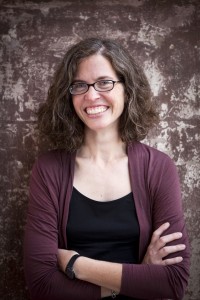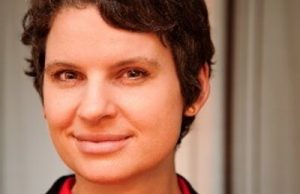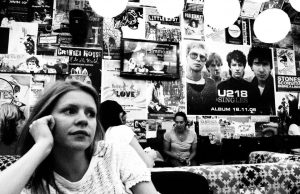Feminists We Love: Alison Piepmeier
 It’s hard to say exactly what distinguishes good teaching from great teaching, but the evidence of transformative teaching is undeniable. Transformative teachers cultivate student followings. Students linger well after class is over to ask follow up questions and to keep the conversation going. When students go above and beyond the requirements of a class–reading the supplementary texts and asking for more, bringing classroom learning to bear on campus activism and community work, extending work on a project well past the time when grades have been turned in–a very particular kind of teaching is happening. Transformative teachers have lines outside their office doors.
It’s hard to say exactly what distinguishes good teaching from great teaching, but the evidence of transformative teaching is undeniable. Transformative teachers cultivate student followings. Students linger well after class is over to ask follow up questions and to keep the conversation going. When students go above and beyond the requirements of a class–reading the supplementary texts and asking for more, bringing classroom learning to bear on campus activism and community work, extending work on a project well past the time when grades have been turned in–a very particular kind of teaching is happening. Transformative teachers have lines outside their office doors.
What I first noticed about Alison Piepmeier is that she was one of those teachers.
As a sociology graduate student at Vanderbilt University, I was interested in teaching above and beyond any other dimension of faculty life. And Alison captured my attention.
“What,” I wondered, “does it take to be that kind of teacher?”
Over the years of working alongside Alison in Women’s and Gender Studies (She was a Senior Lecturer. I was a graduate program assistant.), I learned exactly what it took, largely from watching Alison synthesize heartfelt teaching, rigorous scholarship, and vision-centered community engagement.
Alison Piepmeier resists being pinned down along the lines that are typically deployed to describe academic labor.
She’s the author of several books including Girl Zines: Making Media, Doing Feminism (New York University Press, 2009) and Out in Public: Configurations of Women’s Bodies in Nineteenth-Century America (University of North Carolina Press, 2004). She is also co-editor of Catching a Wave: Reclaiming Feminism for the 21st Century (Northeastern University Press, 2003). But Alison is a stellar teacher and a vibrant change agent too.
HLT: Before the terms “public scholarship” or designation “activist scholar” became so popular, your work synthesized theory and practice, scholarship and activism, the personal and the political. I’ve never said this to you, but I think that my own approach to writing has been deeply shaped by what I’ve seen you do. As I began to write publicly and wondered what to reveal and what to keep private, I often thought, “What would Alison do?” For years you’ve blogged, but unlike so many blogs by academics, your entries are deeply personal, often vulnerable, and yet you bring your critical lens to what’s happening in your life. For example, you use a recent post about your daughter Maybelle to raise questions about standardization and normalization. One element of TFW’s mission is to make space for this kind of writing. How have you decided to be so transparent about your life? What possibilities does this kind of writing make for feminism, and are there costs to writing in these ways?
Alison Piepmeier: Whoa, Heather, what a great compliment! I’m honored that my work has been part of your own scholarly practice.
My non-answer to this question is that to a certain extent I think this is just who I am: my lived experiences play a large role in what I’m fascinated with, what I’m wrestling with, and I’ve recognized that when I let this personal material drive the bus, my work is easier and more important to me. I’m interested in the theoretical frameworks that connect to my lived experience.
I’m willing to be vulnerable. I have many colleagues who aren’t, and I think that’s an entirely understandable–and valid–decision to make. I wouldn’t begin to suggest that the way I’m putting my life out there is the way things should be done. I’ve considered that I might regret this at some point in the future. I don’t worry at all about writing about myself–I’m an adult, and I get to decide what can be public. Part of this is that I have the safety of tenure, but that’s not actually a real answer, because I was doing this sort of intensely personal work before tenure. (I wrote an incredibly controversial personal essay about abortion, “Choosing Us,” my second year at my job, for instance.)
I’m aware that when I’m writing about Maybelle I’m using her actual name and pictures of her, and I don’t want to do this unethically. Some parent writers I know don’t show pictures of their children or use their names at all, while others–Ayun Halliday, for instance, who writes the long-running (and fantastic) zine The East Village Inky–write about their kids openly. I had the opportunity to talk with Ayun as I was writing my book Girl Zines, and she said that now that her kids are old enough to weigh in, everything she writes about them has to have their approval. It’s tricky, though. I follow obvious guidelines: I don’t write about things like potty training, and I don’t put naked pictures of Maybelle online. But is that enough? Will she look back later and feel that I’ve violated her privacy?
Okay, but let’s go back to me and my openness about my own life. As I’m writing about prenatal testing and Down syndrome, I’ve had colleagues ask if my openness about being Maybelle’s mother makes me less credible. Are people just going to write me off as a mother who isn’t objective? My answer to this is, yes, I’m not objective. Am I biased because of my personal connection? Yes, I’m biased. I don’t align with many of our culture’s beliefs about intellectual disability—not because I’m duped by my lived experiences but because my own lived experiences allow me to see how flawed that logic is and to call for a paradigm shift.
Biased populations have been the ones to make big-time social change happen. (White) women were central to getting (white) women legal and political identity. Men and women of color have led the Civil Rights movement. The LGBT population has been at the forefront of gay marriage. These shifts are initiated by biased populations, by those who felt the ways in which their personhood was being dramatically limited, and those who loved and valued them.
It’s often an intimate connection of love or friendship that allows someone to see beyond the narratives of dehumanization, despite how fully a culture presents those narratives as “rational.” I may have believed that someone with an intellectual disability was a tragic figure, but my intimate connection with Maybelle demonstrates to me experientially, kinesthetically, emotionally—and ultimately even cognitively—that my previous views were bullshit. Maybelle is a joy. Her morning dancing, her happy proclamations of “Good morning!” to strangers as we bike to school, her arm-waving excitement when she sees her Uncle Trey, are all great pleasures in my life. While she’s also a child and therefore creates plenty of challenges, to see her as tragic, as better off having been prevented from being in the world, is a harmfully limited view—harmful to Maybelle, to me, and to the culture perpetuating tragic stories.
Over time populations that have been dehumanized have demanded that their culture assess human value differently, and ultimately the culture began to shift. So I think my openness about my life with Maybelle–and my bias–are valuable.
HLT: One point of connection we have is Vanderbilt, but another is that we also have collaborated with Vali Forrister on Act Like a Grrrl, leading teenage girls through a sort of feminist consciousness raising (grrrl style). At the same time that you’ve done hands on activist work, you remain firmly rooted in “the academy.” What advice do you have for other feminists who are aiming to be, in TFW Collective member Alexis Pauline Gumbs’ language, community accountable scholars?
Alison Piepmeier: I have this conversation with my Women’s and Gender Studies students all the time. At least once a week. Should they go into the academy, or should they become activists? There’s obviously no right or wrong answer here, but some of the components of these two options can be surprising. Although the academy is a professional institution, and therefore might seem less radical, it does provide some security to allow scholars to say what they want to say (once they have tenure). Jobs that seem like activist jobs, on the other hand, often involve working for nonprofits, and working for a nonprofit often requires a level of strategic self-presentation that can be quite limiting. If the continued existence of your nonprofit depends on your successful fundraising, and if the people with money are conservative (as is often the case), then you really can’t be as radical as an academic.
I’m allowed to write about how pissed off I am about varieties of things. If I had to please donors, I’d have to be careful.
My advice to feminist scholars is
1) Create allies, in and out of the academy. Think interdisciplinarily and make friends outside your department. If you can create allies who are higher ranking officials on campus, they can provide a lot of safety and guidance.
2) Be connected to the community. The academy can be an isolated world that doesn’t let you see the things that matter outside. Part of this can involve being connected to your students, and it can also involve being connected to activist organizations off campus.
3) Recognize the power of your work and your voice. The press cares what you have to say. Community leaders care what you have to say. It’s easy for scholars, particularly female scholars, to downplay their power, but academics do have powerful voices, and when we speak out, people listen. They may be pissed off, but that’s a good thing.
4) Cause trouble! I’ve been at a conference this weekend, the National Society for Genetic Counselors’ Annual Education Conference, and several of the folks I’m here with have been talking about the importance of being a radical bitch. This is an important role.
HLT: Yes! In recent years, you’ve been writing extensively on prenatal testing, Down syndrome, and reproductive decision making, and you have a book in progress about these issues, right?! What strikes me is that you are sorting through big feminist questions–like abortion–but in a deeply intersectional way. Specifically, in your recent New York Times posts, you look at reproductive politics as a feminist, as a mother of a daughter with Down syndrome, and as a disability scholar. How has your turn toward disability studies changed your feminism?
Alison Piepmeier: I might change my mind on this, but right now I want to say that it hasn’t changed my feminism paradigmatically. It’s been a logical expansion. Feminism is a movement working to eradicate all forms of oppression that keep people from achieving their full humanity, and the stereotypes and prejudices against people with disabilities certainly keep them from achieving their full humanity. Our beliefs about what disability is and what it means are socially constructed, and social construction is a phenomenon with which I’m incredibly familiar.
So it seems to me that feminist disability studies is completely obvious and easy. Once feminist scholars and activists have disability on their radar, it’s easy to recognize it and to incorporate it into the work we do. This has been my experience, and the experience of my students, too.
I’ll say that it’s required me to continue to challenge some of the familiar forms of feminism–the white, middle-class, straight, female version of feminism. That’s important work, and should be continuous work for feminist scholars and activists. We’re never “finished” with that process.
With reproductive issues, I’ve found reproductive justice to be an incredibly useful framework. Reproductive justice scholars haven’t necessarily focused on disability (with some notable exceptions–thank you, Andrea Smith!), but it’s a theoretical model that works beautifully to create more complex conversations about reproductive decision making and disability.
And yes, I’m writing a book, currently called The Good Mother: Confronting Impossible Choices and Changing the Game.
HLT: I wonder if you saw Mia McKenzie’s (of the blog Black Girl Dangerous) recent post “No More Allies.” I deeply appreciate how McKenzie is asking us to sincerely consider how our politics is reflected in our action rather than our identity. How do you do feminism in everyday life–as a colleague, as a teacher, as a mother, as a neighbor, as a friend?
Alison Piepmeier: That’s a great post. I hadn’t read it until you asked me about it, but it’s getting at something really important. Particularly in social justice communities, it’s so easy for privileged folks to want to get credit. And I suspect I’m among those privileged folks more than I’m aware.
How do I do feminism? It’s a profound ideology for me, but it comes out in lots of tiny, day to day ways, which I think is crucial. For example, of course I do my best not to use gender stereotypes to view or shape the folks around me, in particular Maybelle. She gets to be exactly who she wants to be. She gets to experiment with identities (which means she’s allowed to wear frilly dresses and she’s allowed to love Batman). I try to create and sustain a world–at least a world immediately around me–that’s very open to all kinds of identities.
Perhaps a little less obviously connected to doing feminism–but connected–I listen. I don’t assume I know the answers, or that I know what someone’s asking or explaining, without doing my best to listen carefully and attentively. This is a commitment I make to my friends, colleagues, teachers, and family.
And I guess this also means that I don’t assume I know what feminism is. Transgender identity is an important identity category, and almost all that I’ve learned about it has come from my students. They’ve helped expand my understanding of and my practice of feminism. I don’t pretend to be the expert. I ask them questions–even questions that might seem ridiculously naive–and they give me great information. They’re generous about sharing thoughts with me because I truly want to know their perspectives.
I try to do this in my classes, as well. Although I have certain agendas, I want to know what my students think. I love it when they help me to see things differently. I’m eager to understand things deeply, and I try to be open to changing my mind.
HLT: At TFW, we’ve been having lots of conversations about professional and personal sustainability. The future of feminist work depends of feminists’ wellbeing. What are your self-care strategies?
Alison Piepmeier: Ooo, this is a good one. I often tell my students and colleagues about the oxygen mask approach: we have to put the oxygen mask on ourselves before we put it on those around us.
Here are some of my oxygen mask strategies:
-
I make it a priority to get enough sleep.
-
I go to therapy (and I’m open about this–I’ve been in regular therapy since grad school, and it’s great).
-
I shut my door–it’s easy to feel like I’m supposed to be entirely accessible, but it’s useful to keep that from being the case.
-
I regularly have coffee with my friends.
-
I work hard to remember that I can–and should–say no to things (I do a better job of this when I frame it as feminist work: I’m a good role model for women around me if I demonstrate unwillingness to take on more work than a man in my position would take on).
-
I spend time with my daughter.
-
I find tv shows that give me some escapism (the latest: Parks and Recreation).
-
And I write: I love writing, so doing it gives me energy rather than sucking it away.
HLT: In my experience, one thing that truly sets you apart, Alison, is the way you have built a life and a career by welcoming and celebrating the new–new ideas (Ie, prenatal testing), new areas of expertise (ie, zine making), new trajectories (ie, becoming a mother), new modes of engagement (ie, writing for the New York Times)–and the ways in which you invite others (via your writing) into the sometimes complicated and sometimes messy process of seeing an issue in a new way. What ideas are you seeing differently these days? What new connections either personally or professionally are you making?
Alison Piepmeier: Again, Heather, the feedback you’re giving me here is so validating! Welcoming and celebrating the new–in my scholarship and, I hope, in my life–is one of the things I love. I wouldn’t be happy being a scholar who keeps studying the same thing again and again–although of course that’s a perfectly good choice for a lot of scholars. What I do is follow my curiosity, and very often I’m making connections between really disparate topics.
I’m more and more interested in reaching a nonacademic audience. I don’t want to be talking exclusively to folks in the academy. I wanted the zine writers I interviewed to be able to engage with the Girl Zines book, particularly since they played such a huge and crucial role in its development. The blog, of course, is a space where I’ve been reaching out, and I’ve done op-eds as well as writing for skirt! magazine, Charleston’s City Paper, BlogHer, and the NYTimes’ “Motherlode.” All of these spaces have generated responses–supportive, questioning, aggressively disagreeing–that my academic writing never does. One of the things I love about teaching is having meaningful conversations, and if my writing can be part of these conversations, too, then that’s exciting and satisfying.
As for what I’m seeing differently, in the last seven months I’ve presented at two conferences in professional fields I’m not related to at all. I presented at a conference in April that was put on by GET (Genomes, Environments, and Traits) and the Personal Genetics Education Project. This month I presented at the National Society for Genetic Counselors’ Annual Education Conference. At both conferences I was the oddball: rather that being a scientist, a medical doctor, a geneticist, or a genetics counselor, I was a feminist scholar. I was there to talk about narratives and cultural meaning-making. I had a personal story to tell, and I had a sense of the larger conversations I wanted to trigger.
At both conferences I was welcomed, but I was surprised to learn that I was raising questions that hadn’t been part of either of those scenes before. Folks there were operating on the assumption that of course everyone needs prenatal testing; of course we want to map the genome; of course we want to eradicate disability; of course we want to improve the human species (I’m exaggerating, but only slightly). I was asking, Why? What would happen if we frame disability differently, if we understand it as an embraceable form of human diversity? Truly a question that they’d never been asked.
So this is an example of professional connections I’m trying to make. At these conferences I learned about how different fields approach questions of disability, identity, and the social construction of human value, and I shared my critiques (and, honestly, recognized that there are even more things I need to critique). I’m honored to be invited to be part of these conversations. And I’m also pleased that I’m at the point in my career and my personal life that I’m able to speak out, to disagree openly, and to move between being a bridge-builder and being a radical bitch.




0 comments